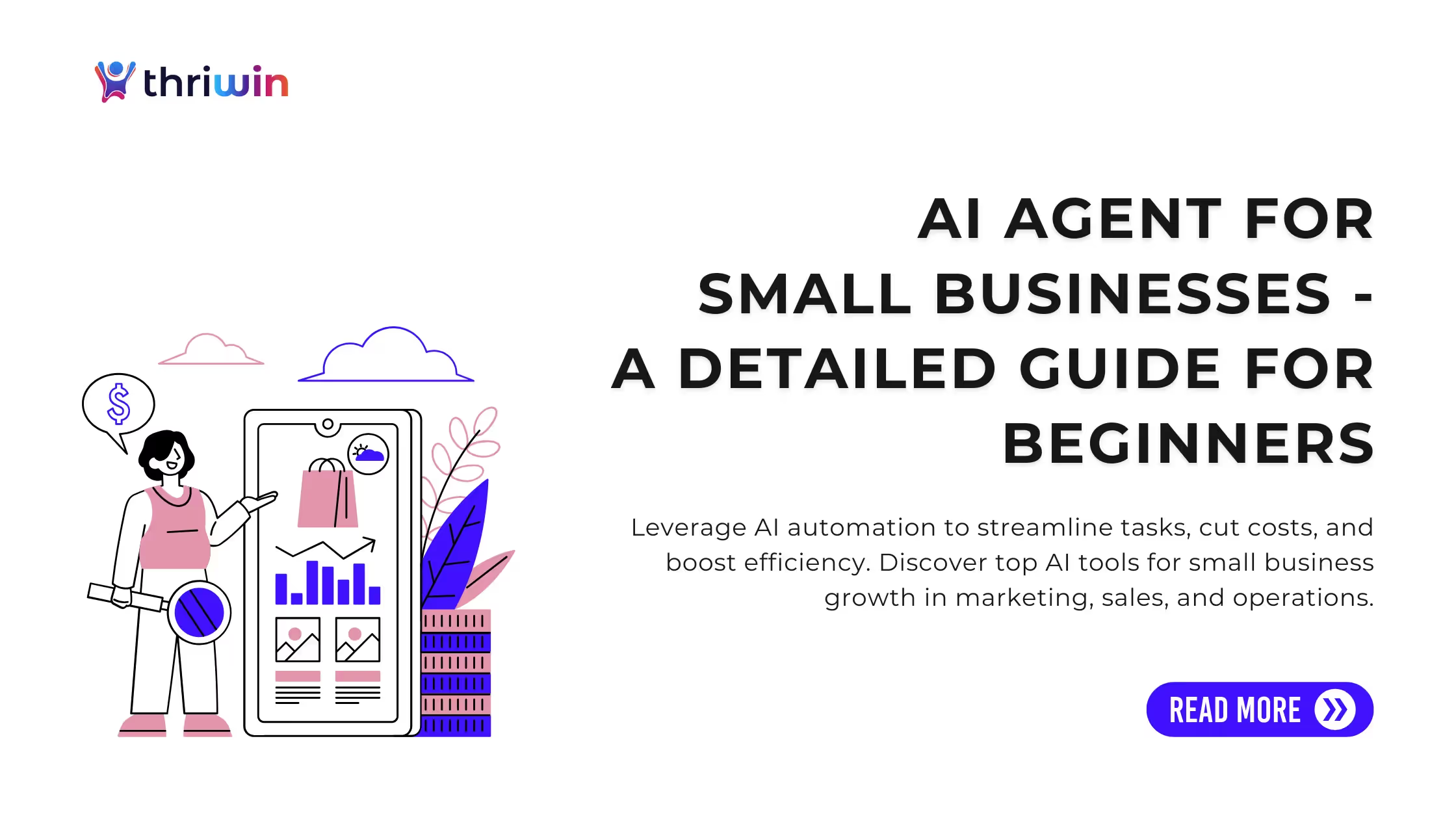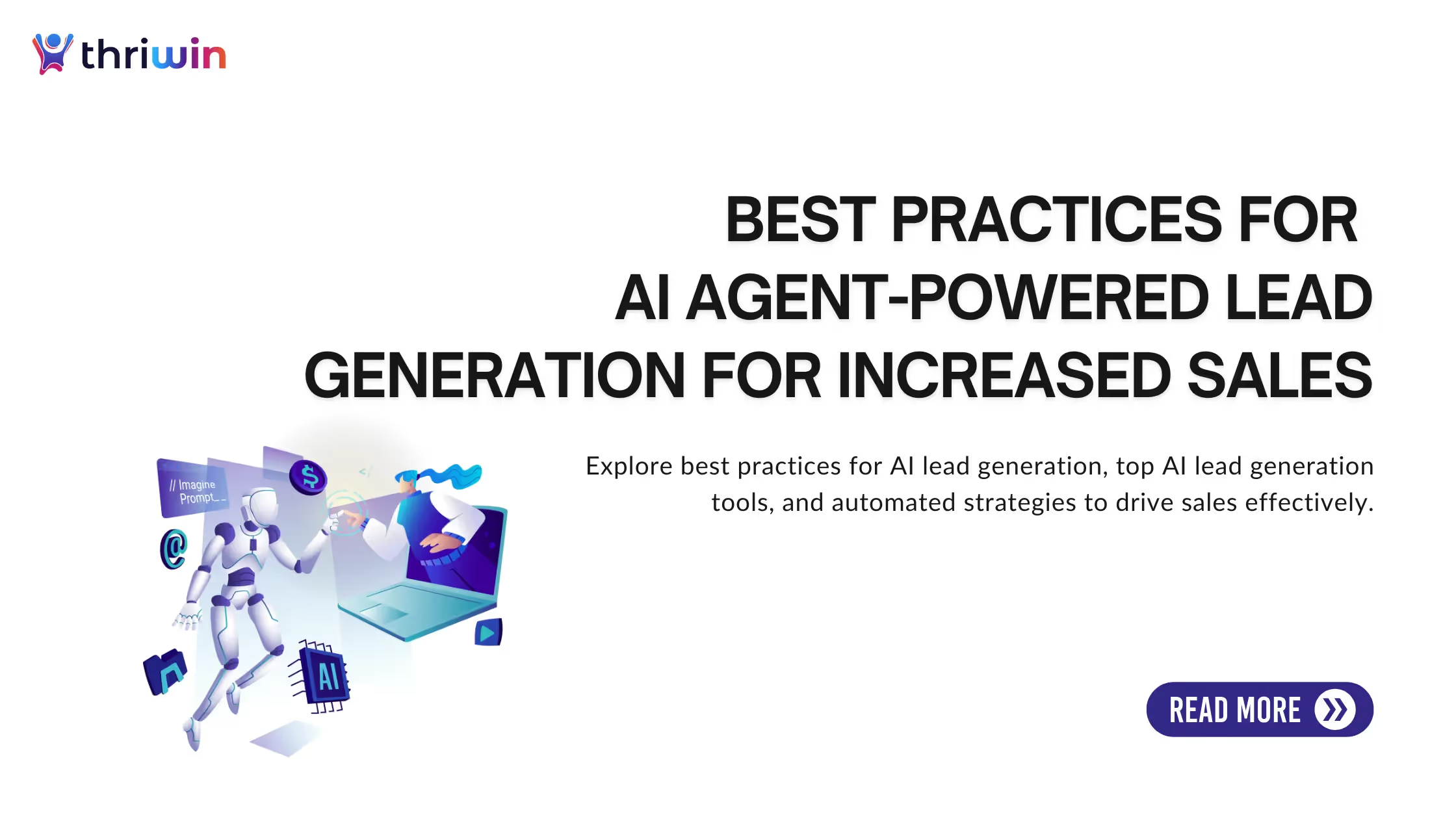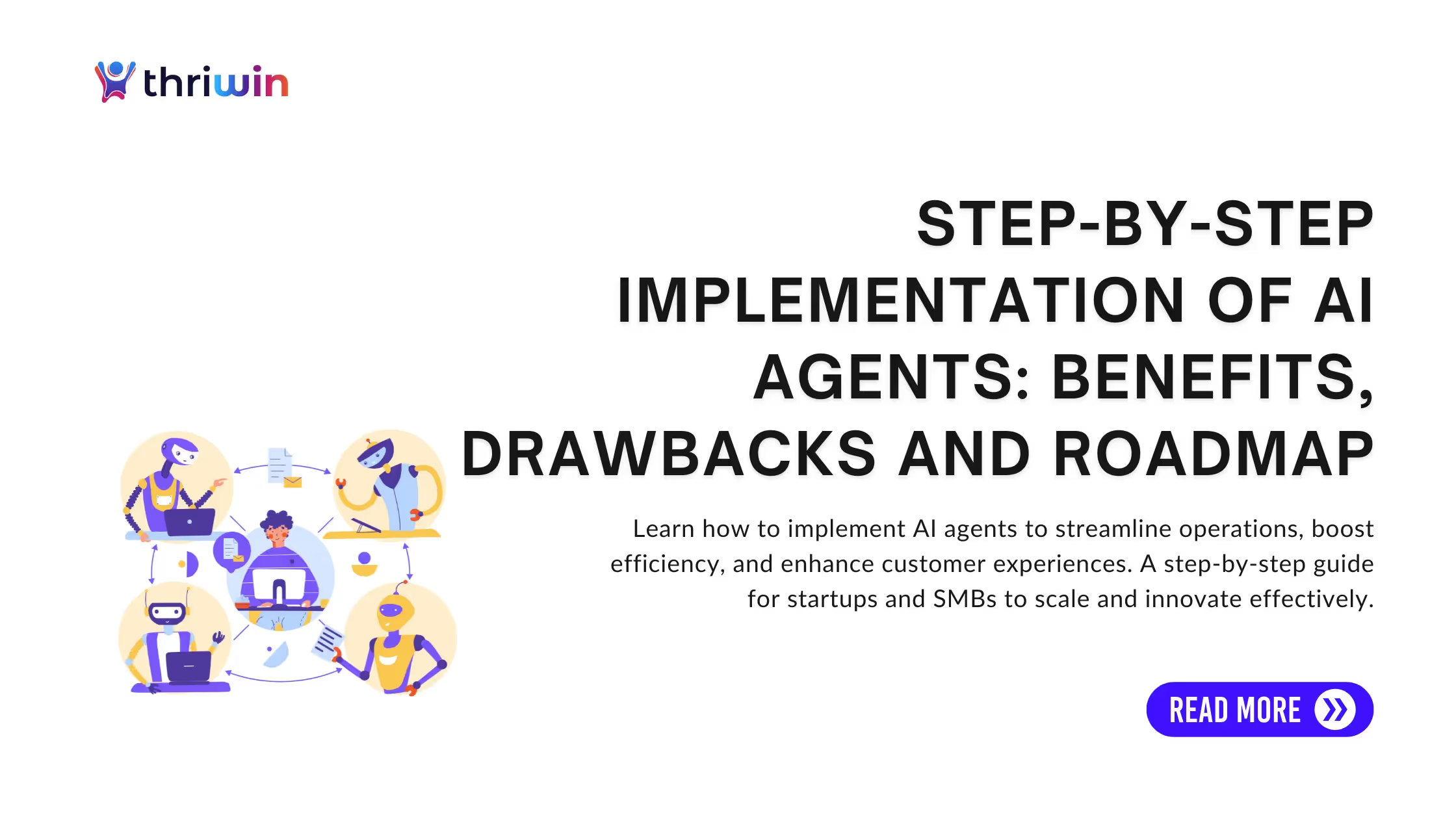Small businesses often seek ways to maximize efficiency with limited resources, time, and budgets, especially in their business operations. Artificial Intelligence (AI) has emerged as a transformative tool, enabling companies to automate repetitive tasks, enhance customer experiences, and make smarter decisions. Deep learning, a subset of machine learning focused on using complex neural networks to analyze data, allows AI to identify patterns and make accurate predictions, enhancing decision-making capabilities in various applications. But with a variety of tools available, where do you start?
This article provides a clear guide to AI agents for small business automation. You’ll learn:
- What are AI agents, and how do they bring value to small businesses?
- The types of AI agents and how they function.
- Real-world applications of AI agents.
- Practical steps for integrating AI agents into your business.
- Benefits, challenges, and the future of AI agents for SMBs.
By the end of this article you’ll know how AI agents can fit into your business and what to consider as you implement them.
Introduction to AI Technology
Artificial intelligence (AI) technology has revolutionized the way businesses operate and interact with customers. One of the key components of AI technology is AI agents, which are software systems that use AI to pursue goals and complete tasks on behalf of users. These intelligent agents can perform complex tasks, such as natural language processing (NLP), machine learning, and predictive analytics, to provide personalized customer experiences and automate repetitive tasks.
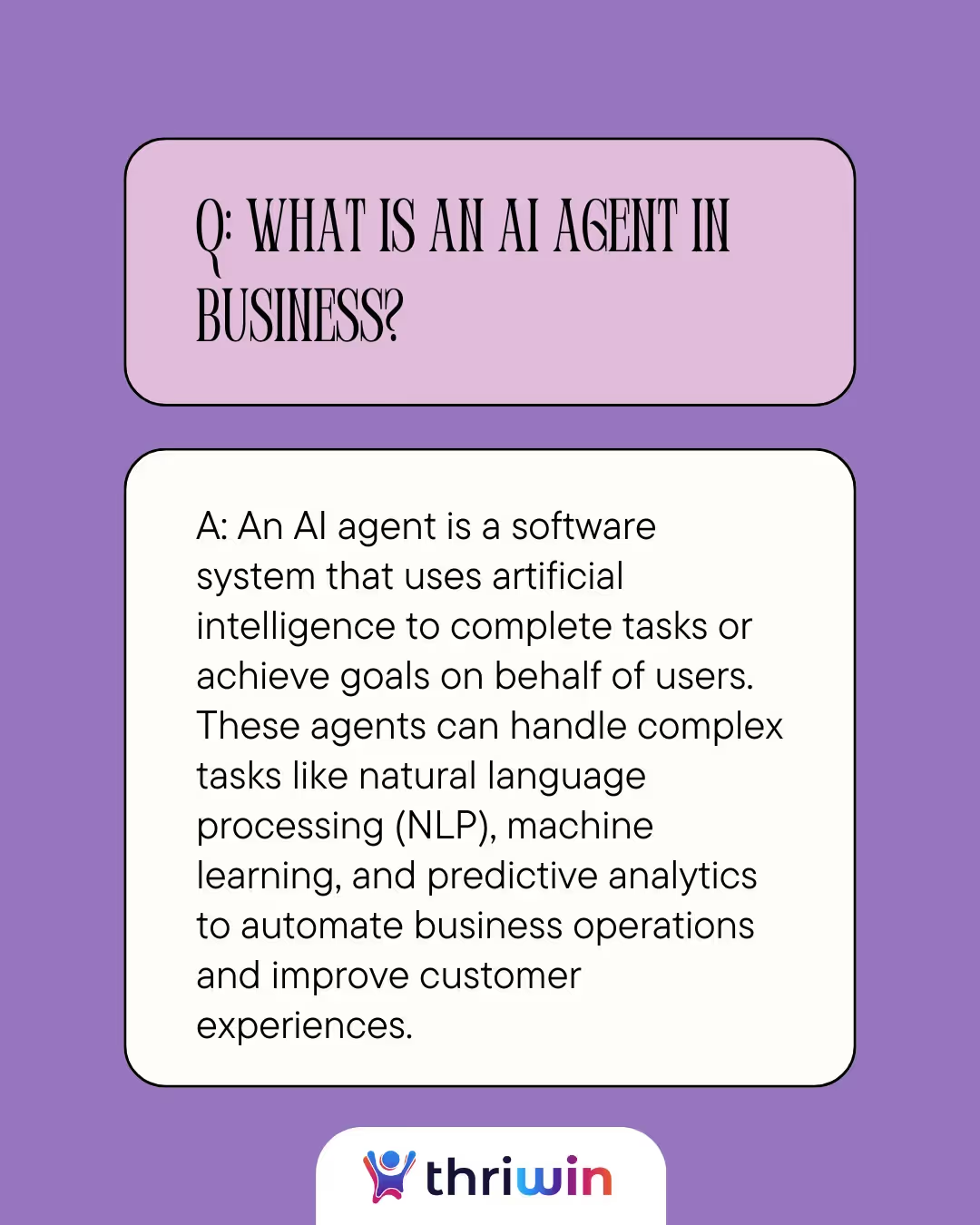
For instance, AI agents equipped with natural language processing can understand and respond to customer inquiries in real-time, enhancing customer satisfaction. Machine learning enables these agents to analyze vast amounts of data, identify patterns, and make informed decisions, optimizing business processes and reducing operational costs. Predictive analytics allows AI agents to forecast trends and customer behavior while ensuring data privacy , enabling businesses to stay ahead of the competition and meet customer needs proactively.
By leveraging AI agents, businesses can streamline operations, improve efficiency, and deliver exceptional customer experiences, ultimately driving growth and success.
What is an AI Agent for Small Business Automation?
An AI agent is software powered by artificial intelligence that automates tasks, makes decisions, and continuously improves through learning. Unlike traditional tools, autonomous AI agents adapt dynamically, making them ideal for small businesses that require efficient and scalable solutions.
AI agents can automate tasks like customer support, inventory management, and marketing analytics, helping small businesses improve efficiency and allocate more resources toward growth and strategy. Utility-based agents employ a utility function to evaluate and select optimal actions based on expected utility measures, which can be particularly useful in scenarios like autonomous vehicles calculating the safest routes.
Examples:
- A chatbot can manage customer queries 24/7, improving response times.
- A financial AI tool can monitor cash flow, categorize expenses, and identify cost-saving opportunities.
By automating repetitive work and perform tasks efficiently, AI agents help small businesses achieve efficiency and scalability while improving customer experiences.
How AI Agents Work
AI agents work by using sophisticated machine learning models to analyze data and identify patterns. These agents can process large amounts of data, including customer data, to anticipate customer needs and provide personalized recommendations. For example, an AI agent might analyze past purchase behavior and browsing history to suggest products that a customer is likely to be interested in.
One of the key strengths of AI agents is their ability to learn from past interactions. This continuous learning process allows them to adapt to changing environments and improve their performance over time. In dynamic environments, such as supply chain management or contact centers, AI agents can provide real-time support and make decisions that enhance the overall customer experience.
Moreover, AI agents can seamlessly integrate with existing systems, such as CRM platforms and e-commerce tools, ensuring a smooth flow of information and consistent customer engagement. By automating tasks and providing proactive support, AI agents reduce the need for human intervention, allowing businesses to focus on strategic initiatives and innovation.
Types of AI Agents
AI agents vary in their functionality and applications, helping businesses automate processes, enhance efficiency, and optimize decision-making. Other agents can collaborate with a primary agent to enhance the execution of more complex tasks and workflows.Here are the main types of AI agents used in small businesses:
- Reactive Agents
Reactive AI agents respond to immediate inputs based on predefined rules but do not store past data or learn from experience. They are commonly used in chatbots that handle frequently asked questions (FAQs) and inventory alert systems. Their key advantages include fast response times and simple implementation. However, they lack adaptability and struggle with handling complex or unexpected queries. A simple reflex agent operates strictly based on predefined rules and its immediate data. Unlike reactive agents, model-based reflex agents possess an internal model of their environment, allowing them to perceive and respond to situations beyond immediate observations.
- Proactive Agents
Proactive AI agents analyze data patterns to predict needs and take preventive actions. These agents are widely used in project management tools for task optimization and sales enablement platforms that suggest business strategies. Their biggest advantage is their ability to anticipate issues and reduce operational risks. Proactive AI agents can identify trends and patterns in data that would take humans much longer to uncover, enabling businesses to act swiftly and strategically. For example, in healthcare, proactive AI agents can monitor patient data in real-time and alert healthcare providers about potential health issues before they escalate. They can also guide doctors in diagnosing conditions by analyzing patient data and suggesting treatment options based on historical outcomes. Additionally, proactive AI agents can predict equipment failures before they occur and schedule maintenance automatically, thereby reducing downtime and saving costs. However, they rely heavily on accurate data and may be less effective in highly dynamic scenarios.
- Collaborative Agents
Collaborative AI agents work alongside human teams, providing suggestions and automating workflows. Examples include AI systems that send payment reminders or perform predictive maintenance to prevent machinery downtime. These agents improve team productivity by combining machine efficiency with human creativity. Hierarchical agents organize tasks into tiers, with higher-level agents managing lower-level agents to achieve common goals. Proactive AI agents, in particular, free up human employees to focus on more complex and creative work. However, they still require human intervention for complex decision-making, making them less autonomous than other AI types.
- Learning Agents
Learning AI agents use machine learning algorithms to improve performance over time. They are widely used in marketing tools that refine email targeting and dynamic pricing systems that adjust rates based on demand. The main benefit of learning agents is their ability to continuously improve and handle evolving tasks. Utility-based agents choose actions that provide the most rewards based on a comparison of different scenarios. However, they require high-quality data and longer setup and training periods to function effectively. Goal-based agents are designed to achieve specific objectives by evaluating the consequences of their actions.
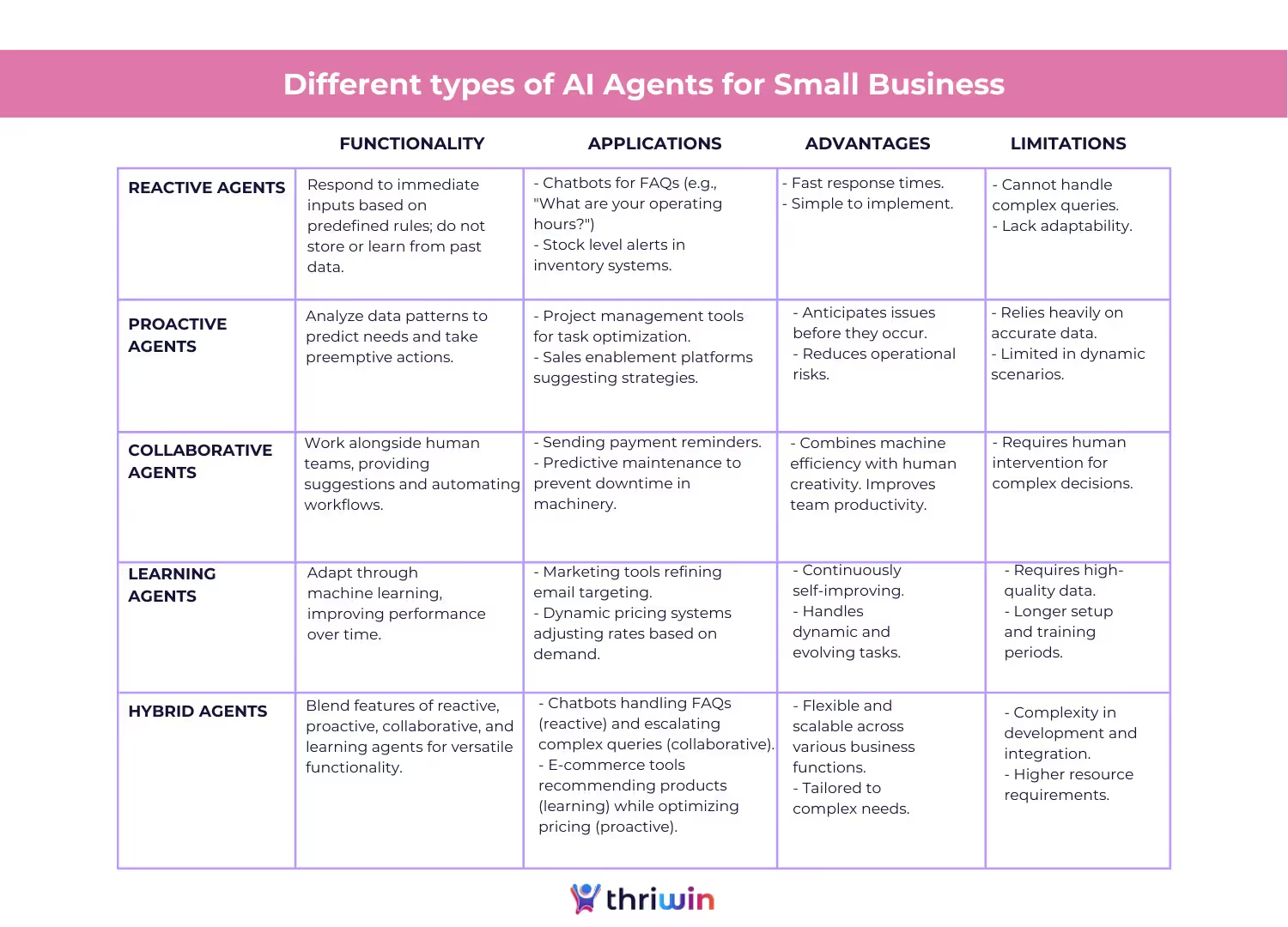
- Hybrid Agents
Hybrid AI agents combine features of reactive, proactive, collaborative, and learning agents to offer more versatile functionality. Examples include chatbots that handle FAQs (reactive), escalate complex queries to human agents (collaborative), recommend products (learning), and optimize pricing strategies (proactive). These agents are flexible and scalable across different business functions. However, their development and integration can be complex, requiring higher resources and expertise.
Key Features of Small Business AI Agents
AI agents for small businesses are packed with powerful features that enable them to automate tasks, optimize processes, and provide valuable insights. These features are underpinned by advanced technologies like machine learning, natural language processing, and cloud computing, making them indispensable tools for modern businesses. Let’s explore these features in detail:
1. Natural Language Processing (NLP)
NLP allows AI agents to understand, interpret, and respond to human language, whether written or spoken. This feature enables seamless interaction with customers and team members, making AI agents particularly effective for customer support and voice-based commands. Large language models (LLMs) enhance AI agents' capabilities by enabling them to learn and make decisions with minimal human intervention.
- Functionality: NLP involves language detection, intent recognition, sentiment analysis, and response generation.
- Example: A chatbot interprets customer queries like “When will my package arrive?” and fetches real-time tracking information from the system to respond accurately.
- Benefits: Enhances customer engagement by providing instant, accurate responses across multiple languages and platforms.
2. Predictive Analytics
AI agents with predictive analytics analyze historical and real-time data to forecast trends and outcomes, helping businesses make proactive decisions. Data analytics helps in analyzing vast datasets to inform strategic planning and operational improvements.
- Functionality: Uses statistical models, machine learning algorithms, and time-series analysis to predict future events.
- Example: AI agents forecast product demand during holiday seasons, enabling businesses to optimize inventory and reduce wastage.
- Benefits: Improves decision-making, minimizes risks, and efficiently allocates resources.
3. Workflow Automation
AI agents automate simple repetitive and time-consuming tasks such as data entry, invoicing, and scheduling. They reduce errors and free up time for higher-value activities by eliminating manual effort.
- Functionality: Robotic Process Automation (RPA) drives this feature, executing predefined task rules.
- Example: Automatically sends follow-up emails to customers after purchases, ensuring consistent communication.
- Benefits: Streamlines operations, reduces costs, and improves overall productivity.
4. Integration with Existing Systems
AI agents are designed to integrate seamlessly with existing business systems, ensuring smooth workflows and data synchronization across platforms like CRMs, ERPs, and e-commerce tools.
- Functionality: Uses APIs and middleware for system compatibility and real-time data sharing.
- Example: An AI tool integrated with Shopify manages inventory, automates reorders, and syncs sales data across platforms.
- Benefits: Facilitates end-to-end process automation without requiring significant system overhauls.
5. Personalization
AI agents analyze customer behavior and preferences to deliver highly personalized interactions, which improve engagement and conversion rates. AI personal assistants leverage user preferences to tailor experiences and streamline interactions.
- Functionality: Employs recommendation algorithms and behavioural analytics to tailor customer experiences.
- Example: Recommends products based on a customer’s browsing history, increasing the likelihood of a purchase.
- Benefits: Enhances customer satisfaction, builds loyalty, and drives revenue growth.
6. Multi-Channel Support
AI agents can manage interactions across multiple communication channels, such as email, social media, and live chat, ensuring consistent messaging and seamless experiences.
- Functionality: Uses omnichannel orchestration to synchronize interactions and maintain conversation context across platforms.
- Example: Respond to inquiries on Facebook Messenger and website chat simultaneously, providing the same level of service on both platforms.
- Benefits: Improves accessibility, ensures consistency, and allows businesses to scale customer support effortlessly.
7. Scalability and Adaptability
AI agents are designed to handle varying workloads and adapt to changing business demands, without human intervention, though their performance depends on proper implementation, data quality, and system integration. This makes them especially valuable for businesses experiencing growth or seasonal spikes.
- Functionality: Leverages cloud-native architecture for horizontal scaling and load balancing to manage traffic surges.
- Example: During a holiday sale, an AI chatbot simultaneously handles thousands of customer inquiries, maintaining response speed and accuracy.
- Benefits: Enables businesses to scale operations efficiently without hiring additional staff.
8. Real-Time Decision-Making
Autonomous AI agents use real-time data to make instant decisions, optimize processes, and improve responsiveness to dynamic situations.
- Functionality: Employs stream processing frameworks and dynamic rule engines to analyze and act on real-time data.
- Example: An AI agent dynamically reroutes deliveries based on traffic data to ensure timely arrival in a logistics company.
- Benefits: Enhances operational agility, reduces delays, and improves resource utilization.
9. Security and Compliance
AI agents prioritize data security and ensure compliance with industry standards and regulations, safeguarding sensitive information.
- Functionality: Implements encryption protocols, role-based access controls, and compliance frameworks like GDPR and CCPA.
- Example: An AI agent handling payment data ensures encryption and adherence to PCI DSS standards to prevent data breaches.
- Benefits: Builds trust with customers and minimizes risks related to data breaches or regulatory penalties.
10. Continuous Learning and Improvement
AI agents adapt and improve over time by learning from interactions and feedback. This ensures they stay adequate and relevant as business needs evolve.
- Functionality: Utilizes reinforcement learning and feedback loops to refine algorithms and enhance performance.
- Example: A customer service AI agent learns from negative interactions and adjusts its responses to better address similar queries in the future.
- Benefits: Delivers increasingly accurate results and stays aligned with business goals over time.
By leveraging these advanced features, small businesses can gain a competitive edge, enhance efficiency, and provide exceptional value to customers. Every feature is designed to address specific challenges, making AI agents a powerful and versatile addition to any business’s toolkit.
AI Assistants and Automation
AI assistants are a type of AI agent designed to assist humans with tasks and provide support. These assistants can handle a wide range of activities, from answering simple customer inquiries to performing complex data analysis and providing actionable insights. For example, an AI assistant can quickly respond to customer questions about product availability or shipping status, freeing up human agents to focus on more complex and high-value tasks.
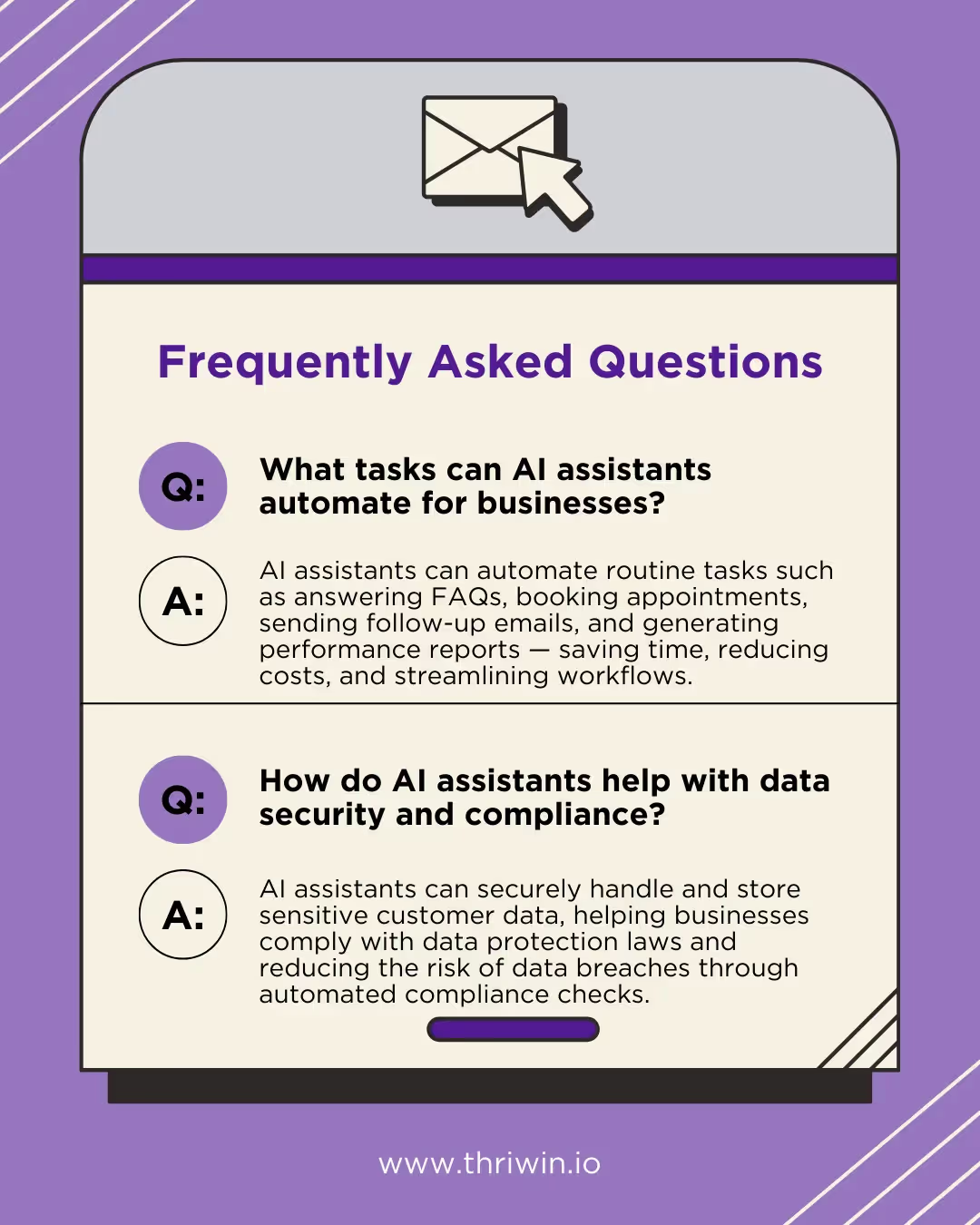
In addition to handling customer inquiries, AI assistants can automate routine tasks such as scheduling appointments, sending follow-up emails, and generating reports. This automation not only improves efficiency but also reduces operational costs by minimizing the need for manual intervention.
Furthermore, AI assistants play a crucial role in ensuring compliance with data protection regulations. They can securely handle and store sensitive data, reducing the risk of data breaches and ensuring that businesses adhere to legal requirements. By leveraging AI assistants and automation, businesses can enhance their operational efficiency, provide exceptional customer experiences, and stay ahead of the competition in an increasingly digital landscape.
Real-World Examples of AI Agents for SMB Automation
AI agents are transforming how small and medium-sized businesses (SMBs) operate, providing tools that deliver efficiency, scalability, and enhanced customer experiences. Here’s how businesses across different sectors are utilizing AI agents:
1. AI Chatbots for Customer Support (Reactive & Collaborative Agents)
Small businesses are leveraging AI-powered chatbots like Tidio, Drift, and ChatGPT-based assistants to handle routine inquiries, appointment bookings, and order processing. A local bakery implemented a chatbot to answer common questions about store hours, cake customization, and delivery options, reducing the burden on staff and ensuring 24/7 availability. Businesses using AI chatbots report faster response times, improved customer engagement, and reduced operational costs. AI agents also help optimize marketing campaigns by building a customer journey in Flow, analyzing performance metrics, and recommending improvements.
2. AI for Social Media & Content Creation (Proactive & Learning Agents)
AI-driven content generation tools like Jasper AI, Canva AI, and Copy.ai help small businesses create compelling marketing materials. For example, a boutique fashion store automated its social media posts and email campaigns using AI-generated content, leading to increased brand engagement and higher conversion rates. Similarly, a fitness coach used AI to create personalized blog content and promotional ads, saving time while maintaining a consistent online presence.
3. AI-Powered Inventory & Order Management (Proactive Agents)
Retail and e-commerce businesses are utilizing AI systems like Zoho Inventory and TradeGecko to track stock levels and optimize reordering. A local grocery store implemented AI-based demand forecasting to adjust its fresh produce orders, reducing waste and improving profitability. In another case, an online electronics retailer reduced stockouts by 40% by using AI to analyze sales patterns and predict future inventory needs.
4. AI for Financial Management & Expense Tracking (Learning Agents)
Small businesses are automating simple tasks and financial workflows using tools like QuickBooks AI, Xero, and Expensify. A freelance graphic designer automated invoicing and late payment reminders, significantly reducing time spent on manual tracking. Additionally, an AI-powered accounting system helped a small restaurant categorize expenses, flag unusual transactions, and manage cash flow more effectively, preventing financial discrepancies.
5. AI in Personalized Customer Experiences (Hybrid Agents)
Personalization is a key differentiator for small businesses, and AI-powered recommendation engines like Dynamic Yield and Salesforce Einstein are helping businesses tailor customer interactions. A local coffee shop introduced an AI-driven loyalty program that suggested personalized drink recommendations based on past purchases, leading to higher customer retention. Similarly, an online bookstore used AI to recommend books based on browsing behavior, increasing sales by 25%. Smart home systems leverage reactive AI to respond to user commands while using proactive AI to learn user habits and optimize device settings for enhanced comfort and energy efficiency.
6. AI for Smart Pricing Strategies (Proactive & Learning Agents)
AI pricing tools such as Prisync and Omnia Retail enable small businesses to implement dynamic pricing models. A small electronics retailer used AI to adjust product prices based on competitor trends and demand fluctuations, leading to a 15% increase in profit margins. Additionally, a boutique hotel automated its room pricing strategy, adjusting rates in real-time based on booking trends and seasonal demand, maximizing revenue. In finance, AI agents can enhance risk management by predicting potential issues and proposing preventative measures based on real-time data analysis and trends.
7. AI for Hiring & HR Automation (Collaborative & Learning Agents)
Recruitment platforms like HireVue and Recruitee are helping small businesses streamline the hiring process. A digital marketing agency integrated AI to screen job applications and analyze candidate responses, cutting recruitment time by 50%. AI-powered tools are also assisting HR teams in assessing cultural fit, scheduling interviews, and providing unbiased hiring recommendations.
How to Start Using AI Agents in Your Business
Adopting AI agents can seem daunting, but businesses can integrate them effectively with a structured approach. Here are the key steps:
Evaluate your business processes to pinpoint areas that could benefit from automation or optimization. Proactive AI agents are increasingly integrated into various sectors, including healthcare, finance, and customer service, enhancing efficiency and decision-making processes. They are also becoming integral in technology, healthcare, and manufacturing, where their ability to predict and act on data insights is transforming operations.
1. Identify Business Needs
Evaluate your business processes to pinpoint areas that could benefit from automation or optimization.
- Example: A small e-commerce business struggling with delayed customer responses can prioritize chatbots for instant support.
- Tip: Focus on high-impact tasks, such as inventory management, customer service, or marketing automation.
2. Research and Select AI Tools
Choose AI tools that align with your specific requirements and budget.
- Example: Tools like Zendesk are ideal for SMBs seeking AI-driven customer support solutions, while HubSpot offers comprehensive marketing automation.

- Tip: Compare features, integration capabilities, and vendor support before finalizing a solution.
3. Start Small with Pilot Projects
To test their effectiveness, implement AI agents in a single department or for a specific task.
- Example: Automate order tracking and responses before scaling to broader customer support operations.
- Tip: Use pilot projects to gather feedback and refine your approach.
4. Train Your Team
Educate employees about how AI agents work and how they can integrate seamlessly into existing workflows.
- Example: Provide training sessions to ensure staff can interpret AI insights or intervene when needed.
- Tip: Address concerns about job displacement by emphasizing AI as a tool for augmentation, not replacement.
5. Monitor and Optimize Performance
Continuously track the AI agent’s performance using key performance indicators (KPIs) like response time, error rates, and ROI.
- Example: Analyze customer satisfaction metrics to determine whether the chatbot meets expectations.
- Tip: Regularly update AI models to improve accuracy and relevance.
Benefits of Using an AI Agent in Small Business
The adoption of AI agents provides numerous benefits, empowering SMBs to compete effectively in dynamic markets:
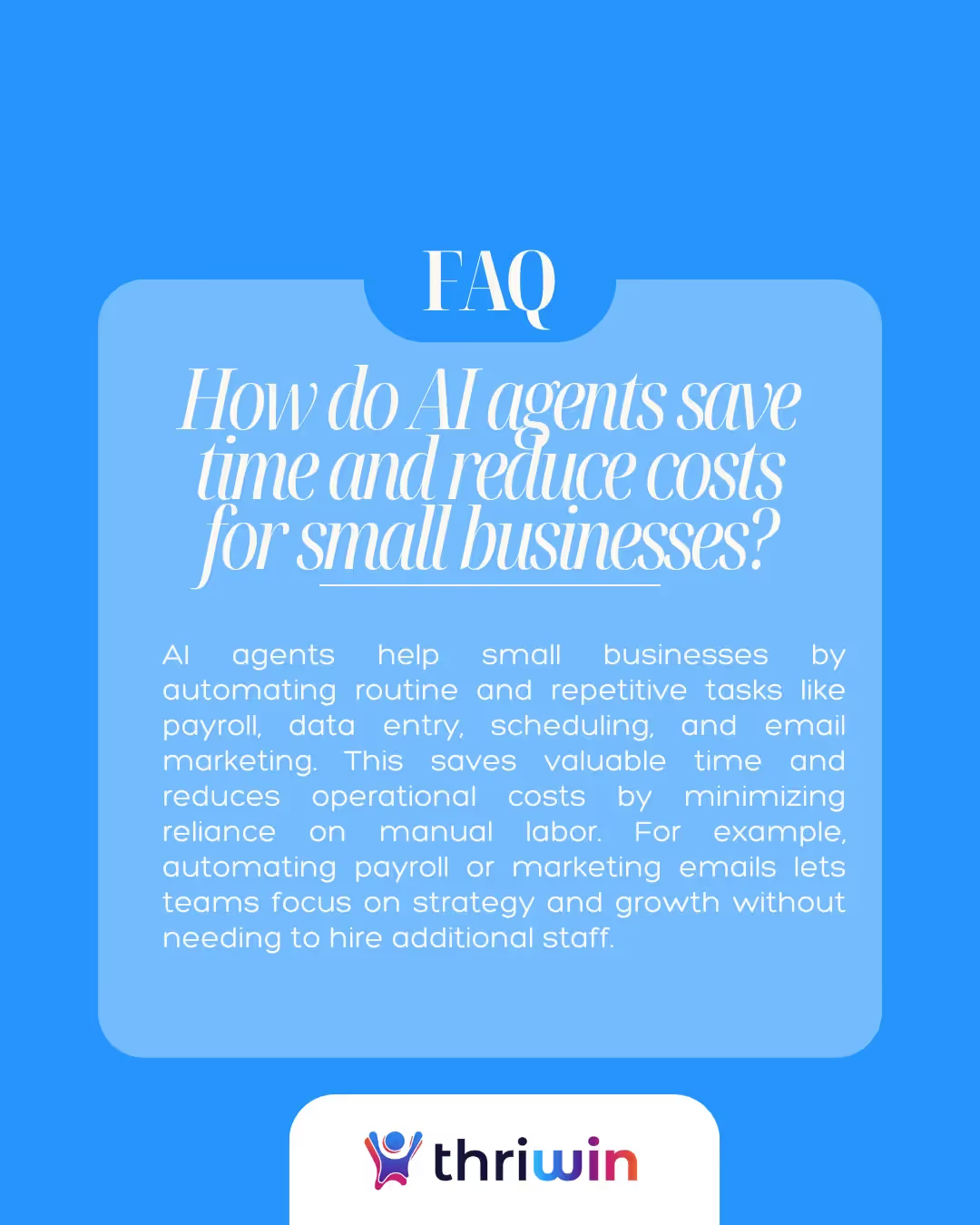
1. Time Efficiency
AI agents automate routine and repetitive tasks, freeing valuable time for strategic activities.
- Example: Automating payroll processing allows HR teams to focus on employee engagement and development.
2. Cost Reduction
By reducing dependency on manual labor for repetitive tasks, AI agents lower operational costs.
- Example: An AI-powered email marketing tool reduces the need to hire additional marketing personnel.
3. Enhanced Decision-Making
AI agents provide data-driven insights that help businesses make informed decisions.
- Example: Predictive analytics tools forecast customer demand, enabling proactive inventory management.
4. Scalability
AI agents enable SMBs to scale their operations without proportionate increases in resources or costs.
- Example: An AI chatbot handles growing customer inquiries without hiring additional support staff.
5. Improved Customer Experiences
AI agents can facilitate prompt and personalized customer interactions, which may improve satisfaction and loyalty if implemented effectively.
- Example: A recommendation engine suggests products tailored to customers' preferences, improving their shopping experience.
Final Thought
An intelligent agent is no longer AI agents are no longer just a concept for tech giants—they are practical, scalable tools that small and medium-sized businesses can adopt to streamline operations, enhance customer experiences, and make data-driven decisions. From automating repetitive tasks to providing actionable insights and personalizing customer interactions, AI agents empower businesses to focus on growth and innovation. The integration of proactive AI agents in various sectors is transforming how we interact with technology, making it more intuitive and responsive to our needs.
However, it’s crucial to approach AI adoption strategically. Start by identifying your business's most time-consuming or error-prone processes, choose AI tools that align with your specific needs, and ensure your team is fully trained to leverage its potential. While challenges like data security, upfront costs, and integration complexities exist, they can be managed with proper planning and trusted solutions.
AI agents are evolving with advancements in machine learning, natural language processing, and integration capabilities, allowing businesses to automate more complex tasks over time. By adopting AI now, businesses can remain competitive in an increasingly automated and digital landscape.
Take the Next Step with Thriwin
Ready to transform your business with cutting-edge AI solutions? Thriwin specializes in helping startups and SMBs unlock their full potential through AI-powered tools tailored to their unique challenges. Contact us today to explore how AI can work for your business and take the first step toward unparalleled efficiency and growth.
Let’s build the future together—schedule a consultation with Thriwin now!
FAQs:
How do AI agents differ from traditional agents?
Traditional agents rely on fixed rules, while AI agents adapt and improve over time using machine learning.
Can AI agents work collaboratively with human teams?
AI agents are designed to augment human efforts by automating tasks and providing valuable insights.
What is the difference between supervised and unsupervised learning in AI agents?
Supervised learning uses labeled datasets for training, while unsupervised learning identifies patterns in unlabeled data.
How do AI agents handle conflicting objectives or goals?
Advanced algorithms allow AI agents to prioritize and balance conflicting objectives effectively.
How can businesses measure the effectiveness of their AI agents?
Effectiveness can be measured through task accuracy, time savings, and ROI.
How do AI agents manage and store data?
AI agents store data securely in cloud or on-premise systems while adhering to compliance standards.
%201.svg)


